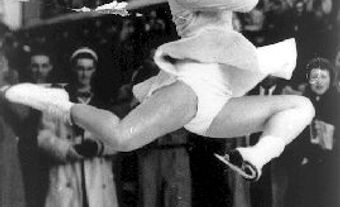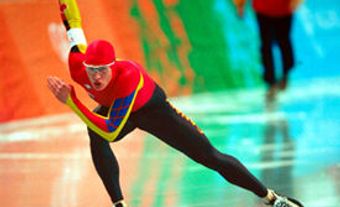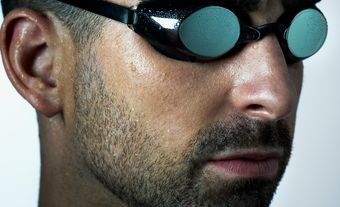This article was originally published in Maclean's Magazine on February 25, 2002
Canadians have never needed banana peels as a cure for rare displays of over-confidence; ice works well enough. It was ice last week on the speed-skating oval and in Salt Lake City's figure-skating arena that momentarily flattened Canada's self-described "best ever" Winter Olympic team. But ice may yet prove its redemption. When you're Canadian, you work with what you know.
The team heading into the final half of the Games has regained its feet and some of its swagger after surmounting, with gutsy performances on and off the field of play, a searing week of disappointment and scandal. Credit an inspiring gold medal win Thursday by speed skater Catriona Le May Doan in the women's 500-m race, and the extraordinary news Friday that gold will replace the disputed silver medals awarded Monday to Canadian pairs team Jamie Salé and David Pelletier. The Canadian duo - beneficiaries of an international firestorm of protest that worked an amazing alchemy on the usually staid International Olympic Committee and the International Skating Union - were at pains to deflect attention. "Other Olympians are doing their personal bests and winning medals but this is what everyone is talking about," said Salé of the scandal. "That's not what the Olympics is supposed to be about."
As if on cue Friday, Beckie Scott of Vermilion, Alta., completed a stirring, photo-finish rush to bronze in the women's five-kilometre pursuit, Canada's first-ever medal in cross-country skiing. That ended a disappointing medal drought so far in the snow sports of skiing and boarding and signalled the determination of Team Canuck to shake two images already frozen into the national consciousness.
Picture 1: The usually sure-footed Jeremy Wotherspoon sprawled like Bambi on the speed-skating oval after a fall barely four strides into his first race cost him a shot at a gold medal in the 500-m race. Picture 2: Pelletier kissing the ice at Delta Center as a radiant Salé raised her arms in premature celebration of Olympic gold. "We had an unfortunate five days or so with the figure skating and Jeremy falling," an obviously relieved Le May Doan said after her skate to glory. "But I think we've shown we're a classy team."
Classy, yes, but not over-endowed with luck. Ice has had its challenges. Elvis STOJKO, at 29 Canada's grand old man of figure skating, finished eighth in his last, gritty Olympic performance. Elvis has left the arena, but the night was defined by the fluid grace of Russian gold medallist Alexei Yagudin, and the huge promise of U.S. bronze medallist Timothy Goebel, a 21-year-old quad-meister. Canada's next best hope, 21-year-old Emanuel Sandhu, was a disappointing scratch after tests showed torn knee cartilage.
The snow side of the team - a once-faithful source of medals - has struggled. Freestyle skiers Jean-Luc Brassard and Stéphane Rochon, boarder Jasey-Jay Anderson and alpine skiers Edi Podivinsky and Mélanie Turgeon registered disappointing results.
By Thursday, there was huge pressure on Le May Doan to win gold and effect a turnaround in the team's fortunes. It was not the weight of Canada's expectations she felt. Her harshest critic - one of her few critics in a sport she dominates - is the 31-year-old Saskatoon-born speed queen herself.
She wore a palpable cloud of disgust after the first heat Wednesday, having merely set a new Olympic record time of 37.30 seconds. The problem, in her mind, was the failure to best her own world record, and the meagre .04-second cushion she built over Monique Garbrecht-Enfeldt of Germany. What followed, as she fretted over the following day's final heat, was one of her infamous dark nights of the soul. "I just put so much pressure on myself," she said.
She relied on friends and teammates, on prayer, and on husband Bart Doan - her Zamboni-driving, rodeo-riding tower of strength. The good guy in the black Stetson was rinkside Thursday as he usually is at her major races or at the Calgary Oval where she trains and he makes ice. It was to Bart she raced for a lingering kiss after relegating Garbrecht-Enfeldt to silver, and before a triumphal, flag-fluttering victory lap, a round of interviews, and the commencement of worry about Sunday's 1000-m race.
This is her last Olympics, says Le May Doan, who won gold in the 500 m and bronze in the 1,000 m four years ago in Nagano. "I feel too old to handle all these nerves," she said emphatically.
Nerves? Germany is an ice-veined medal machine, winning big in everything from luge to biathlon. And the U.S. - a remarkably gracious host - is parlaying home-ice advantage into a record run. Canada, which hoped to outrun the Americans, is instead specializing in the Olympic Nerve Wrack.
Take the first Monday of the Games, please. It was, as Wotherspoon would later concede, "a rough day for Red Deer." Both Salé and Wotherspoon are natives of the Alberta city, but equal measures of Black Monday grief were shared in Pelletier's tiny birthplace of Sayabec, Que., across Canada and, it would seem, by millions of instant television experts in the geopolitics of figure-skating judging.
The judging controversy's one blessed by-product: it distracted athletes and fans from a new FBI warning of a possible imminent terrorist attack on an American target. While the Utah Olympic Public Safety Command distributed photos of the suspects on the FBI list, it's hard to imagine security getting tighter without closing the rinks and slopes to all but athletes. The U.S. already has more troops deployed in Utah than in Afghanistan.
Visitors to events, concerts, bars and the grounds of Temple Square, the downtown headquarters of the Church of Jesus Christ of Latter-Day Saints, walk through metal detectors and submit to body searches and equipment tests. Even here, military personnel and the relentlessly cheerful local volunteer security staff often whispered a sympathetic "You were robbed" after spotting a Canadian ID tag.
"Everybody, please hug a Canadian," a morning host on KSL, a Salt Lake City news radio station, implored on Tuesday. Hugs are nice on a cold winter's day, but the mantle of Designated Victim of the 19th Winter Games is not a comfortable Canadian fit.
It was a determined Wotherspoon who returned to the oval Tuesday for the second leg of the two-day 500-m event. Although he couldn't possibly win after Monday's spill, he proved something to the competition, and to himself, by posting the day's fastest time. He was already looking ahead to Saturday's 1000-m race, where his world record time of 1:07.72 is commemorated in a plaque above the oval's entrance. As for the fall, he shrugged later, "It's just one of those things that happens when you really go for it." There are lessons to be learned from such events. Though, he added softly, "not necessarily about skating."
A hard lesson - how do you train for disappointment? - but not one that applies to those without great expectations. Consider Cindy Klassen, the Winnipeg-born speed skater who blasted through the last lap of the 3,000-m race Feb. 10 to win a bronze - Canada's first medal of the Games. With teammates Clara Hughes and Kristina Groves also finishing in the top 10, the trio showed the enormous promise of the country's long- and short-track teams. "I didn't think I was really a medal threat," said the 22-year-old Klassen after shaving almost four seconds - an eternity - off her personal best time.
Not bad for a washed-up hockey player. Klassen, a former member of the national junior hockey team, was cut during tryouts for the 1998 women's Olympic team. Convinced her childhood dream of a medal was dead, she almost quit sports to study at a Christian college in Germany. Instead, at 18, she tried speed skating, inspired by Le May Doan's and Wotherspoon's podium appearances in Nagano. "I'm really glad that happened," she says of her past disappointment.
Meantime, out of the Salt Lake spotlight, a defining characteristic of the Canada-U.S. relationship was coming clear. Canadians get curling. Americans are mightily puzzled - and dismissive - of the formidable string of victories Canada's men's and women's rinks were ringing up in suburban Ogden. "Perhaps best described as bocce on ice with a broom," opined the New York Times, which also dubbed it a "quasi-sport." Graciously, the Canadian rinks of Kelley Law and Kevin Martin have confined their rock throwing to the ice sheet. Both rinks are conducting missionary work on behalf of the sport between battling opponents in the preliminaries. Martin even found himself peppered with questions from the stands on Monday as his rink beat Britain 6-4. "I didn't mind," he says. "What the heck, they were interested."
What the crowd did understand on Monday, and applaud and cheer, was a brief dignified Olympic tribute to the late Sandra Schmirler, the beloved skip from Biggar, Sask. Schmirler, who died nearly two years ago of cancer, led her rink in 1998 to the first-ever women's Olympic gold medal in curling. She was remembered as a perfect Olympian: a ferocious competitor, and a classy human being. There was a lot of that going around last week.
Maclean's February 25, 2002

 Share on Facebook
Share on Facebook Share on X
Share on X Share by Email
Share by Email Share on Google Classroom
Share on Google Classroom


